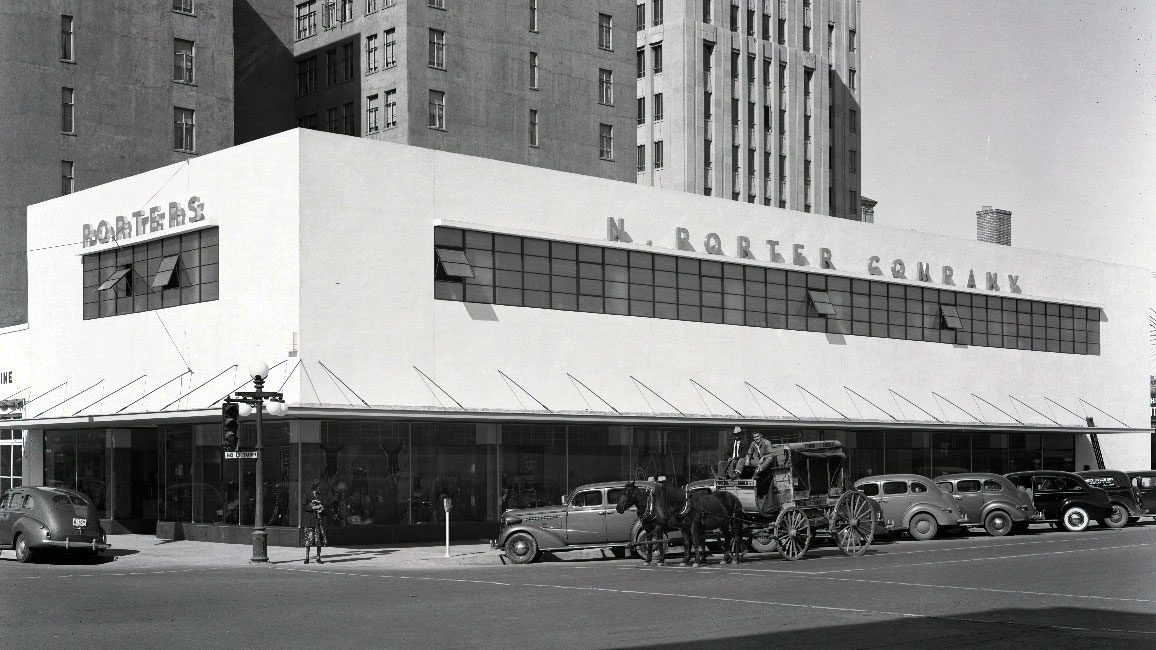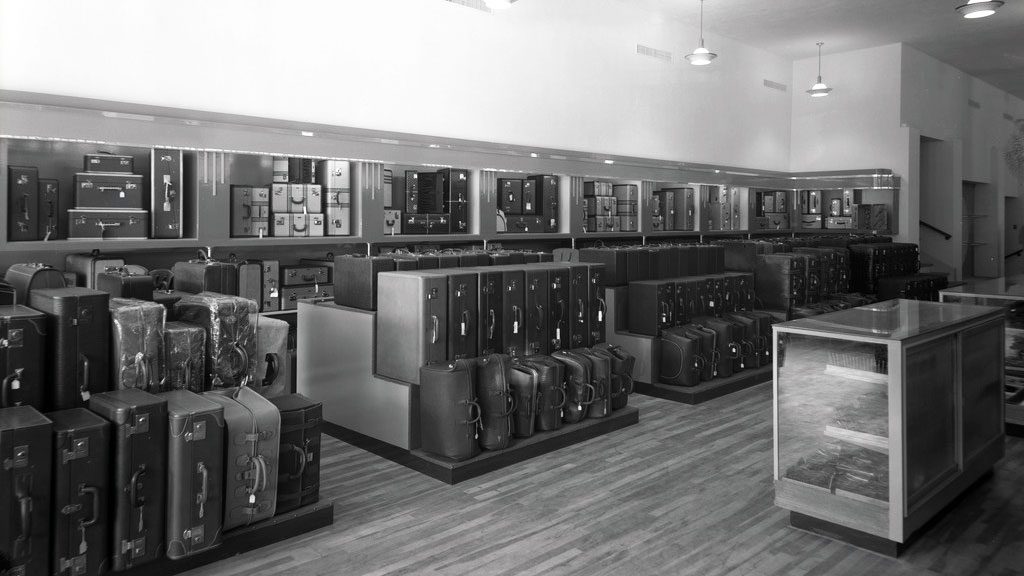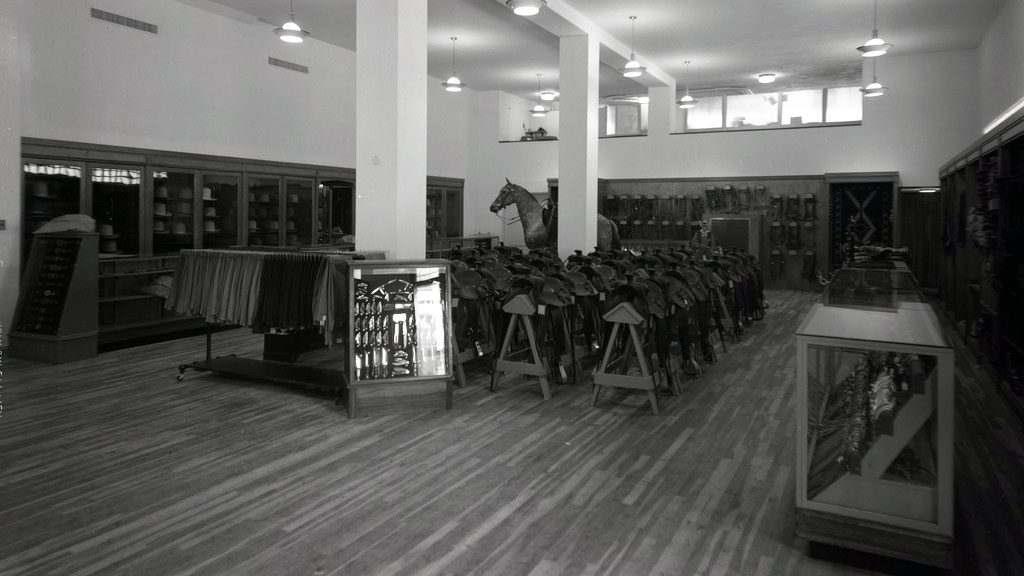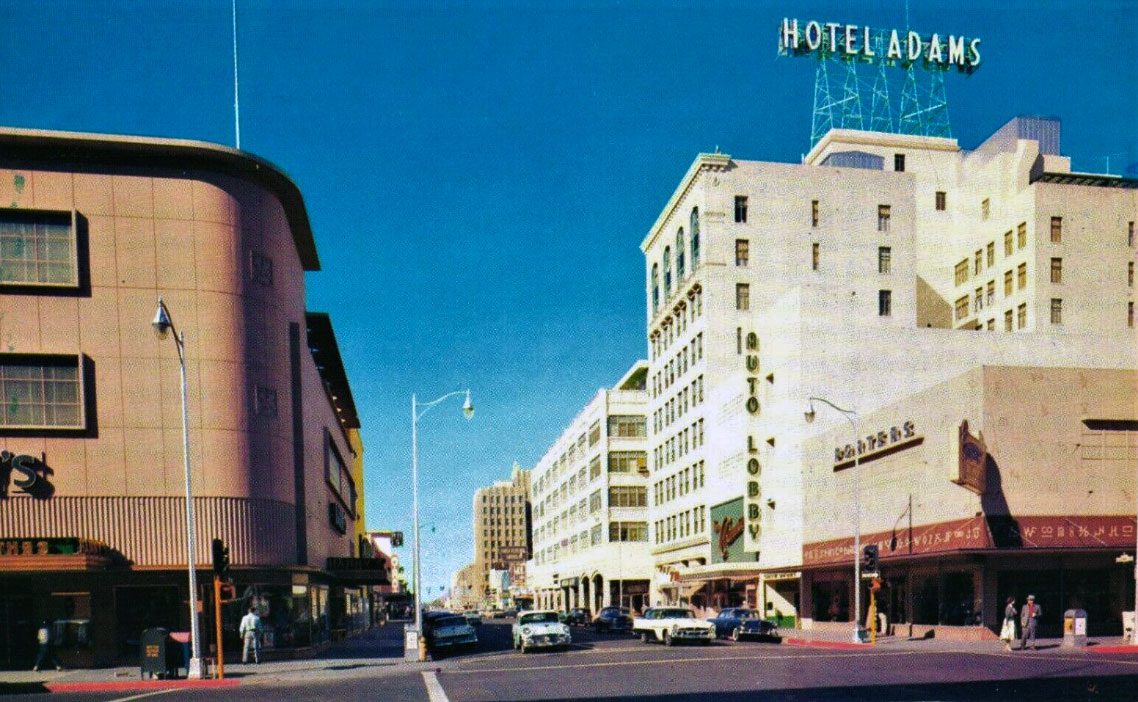
N. Porter Company store, 1940s. (Photo: McCulloch Brothers Inc. / Arizona State University Libraries)
Downtown Phoenix was the city’s busiest shopping district until the 1960s, due in part to “The West’s Most Western Store.” The N. Porter Saddle and Harness Company, commonly known as Porters, was renowned for quality boots and luggage.
“Porters had a distinctive smell of leather and old Phoenix money,” recalls Bernard Dougherty, a retired Maricopa Superior Court judge. “They sold clothes, and you could even buy a saddle.”
The business was founded in Texas in 1875 and relocated to Phoenix in 1891. Porters changed addresses as the city grew and, by 1940, was located at the northwest corner of First and Adams streets.
At that location, Ottilia Linsenmeyer had a modern building constructed where her family had previously operated a meat market. The $65,000 Streamline Moderne style, two-story structure was designed by the architecture firm of Lescher and Mahoney.

Luggage display in Porters, 1940s. (Photo: McCulloch Brothers Inc. / Arizona State University Libraries)
Porters featured Western wear and outdoor equipment on the first floor and basement, while the second floor had a leather shop. The store’s grand opening at its new location in 1940 featured Simon Pure sleeping bags, Victor tennis rackets, Hendan shirts, Field and Stream sportswear, Martin bits and spurs, Ralph-Pugh leather coats, and McCabe Silversmiths jewelry.
But the store was famous for its saddles. “The life of an N. Porter saddle is so long that the cowboy, rather than the saddle itself, is the first to wear out,” said Walter King, a 25-year Porters employee in a 1940 article in “The Arizona Republic.”
“Consequently, our saddle business volume depends on a far-flung market that reaches from Africa to Canada and receives orders from places few people have heard of, including Jiffs, NV; Pie Town, NM; Bromide, OK; Spur, TX; Consumers, UT; and Wolf Hole, AZ. The N. Porter Company gives each of its saddles an individual number and keeps a permanent record of each saddle by that number,” King added. “At present, we have in our files complete descriptions of more than 14,000 saddles that we have made.”

Saddle display in Porters, 1940s. (Photo: McCulloch Brothers Inc. / Arizona State University Libraries)
Porters was a tourist destination. “Those who visited from the East wanted to return wearing their Western duds, to be able to show their friends where they went,” says William Linsenmeyer, the building owner’s grandson.
In 1947, Porters became famous for something other than cowhides: Arizona’s first escalator. “Some people came in just to ride it up to the second floor,” Linsenmeyer says. “A lot of people in those days didn’t travel much and had never seen an escalator.”
The escalator only took shoppers up—with one exception. “When Ottilia stopped by on rare occasions and wanted to come down from the second floor, Porters flipped the switch,” recalls Linsenmeyer. “The escalator reversed direction and took her down. All others had to take the stairs.”

Postcard showing Porters next to Hotel Adams, 1950s. (Courtesy of: Douglas Towne)
Porters closed their downtown store in 1962. The building was razed to make way for the Hotel Adams (now the Renaissance Phoenix Downtown Hotel), which opened in 1975.
Although Porters has been closed for 60 years, its former employees remain loyal. “In my opinion, it was the greatest family store in Phoenix,” declares Roger Anderson, one of its last employees. “If they were still open, I would still be there. I loved that place!”
About the author: Many years ago, Douglas Towne introduced himself to Phoenix native William Linsenmeyer, whose grandmother owned the building where Porters Western Wear store was located, at the Lincoln Family Downtown YMCA. The meeting was sparked based on the latter wearing a t-shirt that proclaimed, “I had a Singapore Sling at the Raffles Hotel (in Singapore).”





